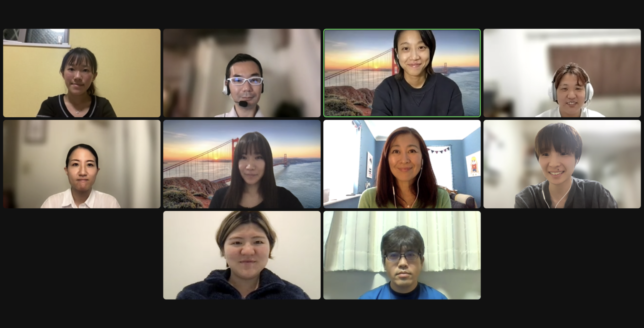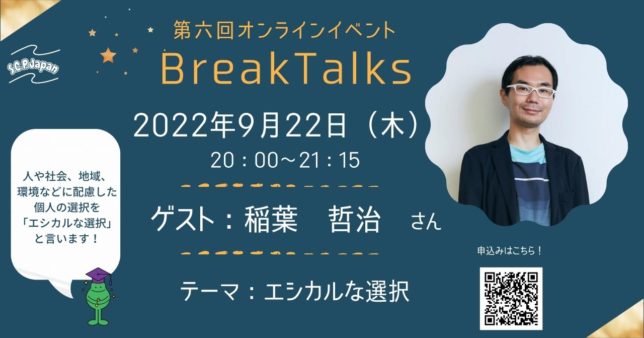
S.C.P. Japan held its sixth BreakTalks event on Thursday, September 22, 2022. We welcomed Mr. Tetsuji Inaba as a speaker, who gave a talk on “Ethical Choices.”
Mr. Inaba dropped out of Tokyo University after attending the prestigious Kaisei High School and experienced a period of social withdrawal. He later used the experience to work for a HR company in Saison Group where he was responsible for NPO collaboration projects. He has since worked for Hitachi Group in new business development, as well as starting a company that supports youth careers, and as a HR consultant. He has also worked for Japan’s largest human resources and HR media company, managing their HR community group.
He now runs an ethical select shop “Ethical-Ya” in Kamakura, as well as being the editor-in-chief of “Circular HR,” a media outlet focused on circular economy, human resources, and work styles. He also serves as a board member of NPO Gewel, which promotes diversity and inclusion, and as a facilitator for World Cafe and OST. He is active in the social enterprise sector, focusing on ethical business. He is hoping to change the way people and society interact through business, producing ethical fashion shows and incubating social enterprises.
The Breaktalk event began with Orime from S.C.P. Japan briefly sharing the reason on why the topic should be discussed, then Mr. Inaba gave the talk, followed by Q&As.

What is Ethical?
Mr. Inaba began by asking, “What is ethical?” He said the reason why we need to think about this now is because the structure of society has changed. “In the past, mass production, mass consumption, and mass disposal were the norm. We made a lot, used a lot, and threw away a lot. The logic also applied to the living. Livestock farming has moved away from humane methods and became industrialized, focusing solely on productivity and profit. Climate change is largely caused by deforestation and arrogant human behaviour. The time has come to change the way we do things, to protect the limited natural resources. We may be at a last turning point towards a sustainable future.”
SDGs and sustainability
You may have known that Sustainable Development Goals (SDGs) have been set by the United Nations, as many companies have recently been promoting these targets. Not many people are aware, however, that the UN had previously set Millennium Development Goals (MDGs). The difference between the two is that MDGs are more focused on how developed countries solve the problems of developing countries, while SDGs are about everyone being an equal stakeholder in achieving a more sustainable future.
What is the difference between “sustainable” and “ethical”?
While many people confuse these two words, Mr. Inaba points out that there are clear differences. “Sustainability” is, so to speak, the hard aspect. It is a mechanism for creating a better society, a system or business model in the way society works. On the other hand, “ethical” is the soft aspect. It is a code of conduct based on ethics, or values.
Mr. Inaba introduced an example of the Amish in the United States. The Amish are known to deliberately distance themselves from technology and still live the way they had lived hundreds of years ago. Their lifestyle is much more sustainable than the rest of the society. So, would it mean, we should all live like the Amish, going back to the Edo period? ”No,” says Mr. Inaba. What we can learn from them, he says, is the importance of balancing our actions considering the environment, science, technology, and culture. As it is increasingly becoming evident that we cannot carry on living the way we are, we must now think about how we can transition to a sustainable future.
Mr. Inaba says, if we create a mechanism to make a more sustainable future, being ethical is the decision we all must make as individuals. It is about our own ways of being, how we relate to others and society, which is unique for each person.
“There are so many things to think about here, even a single mobile phone or computer that we use every day. Take a nice piece of clothing you just bought, for example. Nice, it may be, but it could have been produced in a sewing factory in Bangladesh, where workers are suffering under the most inhumane working conditions, just like the “Rana Plaza tragedy(*1)”. Or the apparel store clerk you bought that from may be working long hours, barely earning minimum wage. Things are never simple in this day and age. Everything is interconnected.”
Mr. Inaba cited the words of Yvon Chouinard, the founder of Patagonia.
“If you know about the problems happening in the world but do nothing about it, you become part of the problem. But if you have the courage to take action, you become part of the solution.”
Yvon Chouinard, the founder of Patagonia
*1 “Rana Plaza tragedy: On April 24, 2013, a commercial building called “Rana Plaza” collapsed in Savar, about 20 kilometers northwest of the capital Dhaka, Bangladesh. It is known worldwide as the largest incident related to the sewing industry. The number of people who died in the collapse of the building was over 1,100. The number of injured was over 2,500, and the number of missing was over 500. The cause of the collapse was due to the vibration of the sewing machine and the generator, and there were cracks and suspension orders had been served, but the owner of the building continued operations, resulting in the loss of many lives that should have been protected. Illegal expansion is also considered one of the causes.
Don’t be afraid of the change
Being ethical is not the same as being environmentally friendly, Mr. Inaba emphasized. “It’s a question of how you live your life, to create a better future. The idea is to decide what kind of future you want to create, based on your own value, and take responsibility for the changes that may come with it.”
He gave an example from an ethical fashion show he has produced.
A woman may choose to wear vegan fashion, such as eco-fur, or kapok. There may be many reasons why she has chosen vegan fashion. It could be animal welfare, health, or the environment. Some may argue, however, that rejecting meat and fur outright is nonsense as we humans are also part of the same ecosystem. Another woman may choose to wear sheepskin garment. She may be doing so to support African countries where they are produced. In this case, she has chosen the products for the cause of “international cooperation”, but this goes directly against other causes like “veganism” or “supporting local produce”. This is just one example of conflicting values.
The thing is that these women are simply acting according to their own values. Although ideas appear to be conflicting, they don’t need to be one way or the other. The purpose of creating a better future is the common ground here, despite seemingly opposite values. Contradictory values can co-exist, by searching for compromises and better solutions, as we live in an intricate interconnectivity of the world today.
Mr. Inaba says that “ethical” is a code of conduct that anyone can follow, and there is no such thing as wrong choice. “It is about knowing how things are connected around you and make choices that lead to a better future and social good.”
By understanding the conflict and thinking about ways to improve it, we can create a better system, where everyone can find a position that they are happy with.
Finally…
Through this lecture and discussion, everyone could gain insights on how to think about making “ethical choices” and obtain tips on how to do so. We hope for a better future, with all of us deciding on our own values and taking actions toward the vision.
SCP Japan will continue introducing a variety of guests and activities through BreakTalks and create a place where diverse people can gather, and opportunities to think about a more diverse and inclusive society.
We would like to express our sincere gratitude to Mr. Inaba. We would also like to thank the staff organizing the event, the sign language interpreters, and all the participants.
